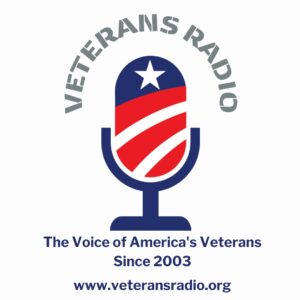Humbert "Rocky" Versace
First Lieutenant James "Nick" Rowe reviewed the reports that had been coming in about enemy activity near the small outpost at Tan Phu in Vietnam. The situation wasn't good, and Nick knew it. Tan Phu was one of two isolated outposts in the Mekong Delta Region of South Vietnam.
The defensive force consisted of four companies, about 380 local Vietnamese and Cambodians recruited for service in the CIDG (Civilian Irregular Defense Group). The twelve men of Special Forces Team A-23 worked with the CIDG and their counterpart South Vietnamese Special Forces (LLDB) to secure the region from the terrorist attacks of the Communist Viet Cong.
Not far from the camp lay the foreboding U Minh Forest, a haven for the enemy into which the Special Forces Team had yet to venture. The year was 1963, well before most Americans had ever heard of Vietnam and two years in advance of the full-scale war that would involve nearly three million American soldiers and cost more than 58,000 lives. In the fall of that year, there were fewer than 1,000 American Green Berets serving in Vietnam to advise the CIDG in the defense of their country.
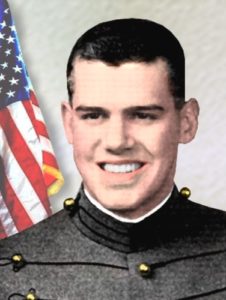
Twenty-five-year-old Lieutenant Rowe believed in what he was doing in Vietnam, was committed to the Special Forces motto to "Free the Oppressed". A graduate of the US Military Academy at West Point, Class of 1960, he also lived and led by the creed Duty, Honor, Country.
Nick looked up as an imposing figure strolled across the small compound at Tan Phu. Tall, strong, with piercing eyes and steel-gray hair, Captain Humbert Roque "Rocky" Versace drew attention wherever he went. The Special Forces Captain had graduated from West Point one year ahead of Lieutenant Rowe, and had already served one full tour in Vietnam, then extended his tour.
Years later, a Marine who had met Captain Versace in Vietnam said of him, "If you were going to ask for a West Point cadet from central casting, he was it."
Like Lieutenant Rowe, Captain Versace believed in his mission. Though he appeared to be a soldier without fear and was a powerful foe in battle, he loved the Vietnamese people and had a captivating smile that warmed the heart of children and civilians. His relationship with these innocent victims of the brewing war in Southeast Asia was further enhanced by the fact that Captain Versace was fluent in both French and Vietnamese. Indeed, under other circumstances, Rocky might have come to Vietnam to minister instead of to fight.
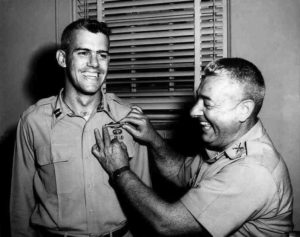
Raised in a strict Catholic household (his mother wrote "The Fifteenth Pelican", a short story that became the basis for The Flying Nun), Rocky was planning to enter the ministry as a priest with the Maryknoll Missions. His father was a career soldier and graduate of West Point, so when Rocky received his own appointment to the Academy, he opted to be a soldier first. He volunteered to serve in Vietnam, and then upon arriving there, still found time to minister.
In the delta town of Camau where he was based, Humbert Versace built dispensaries, procured tin sheeting to replace thatch roofs, and arranged for tons of bulgur wheat to feed family pigs. He even wrote to schools back in the United States, encouraging them to send soccer balls for the village playgrounds. At Christmas time in 1962 Rocky voiced his convictions in a letter home stating:
"I am convinced that your taxpayers' money is being put to a very worthy cause--that of freeing the Vietnamese people from an organized Communist threat aimed at the same nasty things all Communists want - at denying this country and its wonderful people a chance to better themselves."
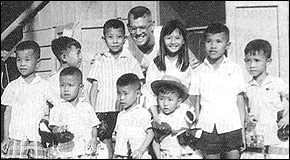
In Camau Captain Versace served as a MAAG intelligence adviser to the South Vietnamese Army (ARVN) in the An Xuyen Province. On October 28, 1963, when he traveled to Tan Phu on a liaison visit to exchange information, Rocky had only two weeks remaining in his second tour, after which he planned to enter the ministry and return to Vietnam on missions of mercy.
As he walked across the small compound now, he carried important information after meeting with the Thoi Binh district chief. Captain Versace had learned that a small enemy force had moved into the nearby hamlet of Le Coeur, eight kilometers from Tan Phu. This posed a very real danger that the enemy could use their command post in the hamlet to launch attacks on Tan Phu.
Captain Humber Versace met with the Team's commander, Captain Philip N. Arsenault to discuss the concerns over the nearby enemy activity. It was decided that a quick strike on Le Coeur should be commenced the next morning. The plan would send out three companies of CIDG and the local militia. Third Company containing the members of the militia would be under command of Vietnamese LLDB Lieutenant Lam Quang Tinh. They would hit the enemy command post and secure Le Coeur, while the other two companies lay in wait between the hamlet and the U Minh Forest to cut off any retreat.
"I'm going too," Captain Versace announced as the men of Detachment A-23 looked up in surprise.
"MAAG advisers aren't allowed to accompany a team on operations," Captain Arsenault reminded Versace.
"Look, we are undertaking this operation because of information obtained in my meeting with the district chief," Versace responded. "That makes this a joint operation with the militia, which makes it my responsibility to be involved."
Humbert Versace was the kind of man who had firm convictions, and when he believed he was right, there was no changing his mind. In the end, after all the discussion, it was determined that Lieutenant Rowe, Sergeant First Class Daniel Pitzer (the medic), and Captain Versace would accompany Lieutenant Tinh and Third Company in the assault on the hamlet.
October 29, 1963, 0300 Hours
Lieutenant Tinh moved his Third Company of militia out of the perimeter at Tan Phu in the early morning darkness and set a course for Le Coeur. Three hours earlier the other two companies had left, planning to skirt the hamlet and set up positions on the other side. When Third Company hit the village, everyone expected the small enemy force there to hightail it for the safety of the U Minh Forest.
As had been expected, when the strike force reached Le Coeur, the enemy abandoned their command post. "We had a good plan and a good bunch of troops and when we hit the hamlet on the edge of the U Minh, the Viet Cong bugged and ran just as we thought they would," Lieutenant Rowe wrote years later. Lieutenant Tinh and his militia entered the hamlet without resistance, finding it deserted. For a time they swept the area for intelligence. Lieutenant Rowe picked up a spent Mosin-Nagant cartridge. Not until later did it dawn on him that the presence of the Russian K-44 shell casing indicated they were facing more than a small platoon of irregular Viet Cong.
Pleased with the mission's success, the American advisors directed the companies to return to Tan Phu. "There was no doubt we had surprised them," Rowe continued in his book Five Years to Freedom. "We caught them completely unaware, but they reacted in just the opposite way than we had anticipated. Instead of falling into our ambush, they set us up for theirs." Instead of retreating into the U Minh Forest, the Main Force 306th Viet Cong Battalion, perhaps as many as 1,000 enemy soldiers, retreated in the opposite direction to lay in wait.
While the ambushers of First Company returned by a route similar to the one they had taken to get to their post between the forest and Le Coeur, the 120-man CIDG company with the three American Green Berets followed the canals back by a different route. By 10 A.M. they had moved about two kilometers down one of the myriads of canals when they saw a line of black-clad Viet Cong trying to cut them off. They had caught up to the retreating enemy forces from Le Coeur, but the enemy was no longer retreating.
From a range of 900 meters, the Viet Cong began firing their automatic weapons at the South Vietnamese soldiers and their American advisers. At that range, this was no great threat, for the allied force was too distant for accuracy. What the enemy small arms and automatic weapons fire did do, was pinned down the allied force while they set up mortars. At first, the mortars that peppered the landscape like hail, fell harmlessly beyond the allied force, as the enemy gunners had not yet established their range.
Suddenly, a group of CIDG broke and ran for the shelter of a bank near a rice paddy. The enemy had fixed the range to that point, and "There was almost dead silence and I could almost picture it in my mind...watching the VC range those (mortar) tubes," Rowe recalled. "And then it came. There was one flight of about 12 rounds and it was almost a complete wipeout of our people who had run for that bank."
The Americans and their CIDG force quickly pulled back into a tree line and set up a perimeter.
And then the VC came, hitting the allied force on three sides
"I never saw so many VC in my life," Lieutenant Rowe wrote. "They must have had at least three platoons coming across that paddy and they just kept coming. As long as our strikers had ammunition, it was like a turkey shoot.
"Then they began to work us over with 57s and 81 mortars and we were taking casualties pretty heavily. And out there beckoning to us was that one big open rice paddy that wasn't being defended and I thought 'what the hell, let's use it.' But then we realized it was what they wanted us to do. They had it ambushed at two tree lines on the other side...a classical three-sided attack with an ambushed escape route.
"We dug in and tried to stop them from overrunning us.
"At this moment two of our (allied) planes passed nearby, a T-28 Caribou, and we thought we had it made but the pilot of the T-28, who had more VC in his sights at that moment than he had ever seen before, radioed that he couldn't engage without authorization from Saigon...and he flew on.
"We had about 120 men and we were dealing out heavy casualties to the Cong, doing the job we were in Vietnam to do, and we weren't all that disturbed at first. But then we began to run low on ammunition and we realized just how many damned VC were out there.
"I had an M1...and I was doing good work with it across those paddies. I went through two bandoleers of ammo and you had to hit something every time you fired in that mass of bodies coming at us. We had Buddhist Cambods with tattoos on their chest that were supposed to protect them from harm and those guys were walking around in our perimeter like it was payday in Tan Phu. Rounds were coming in all over the place, mortars, 57s, small arms fire, and these guys were walking around checking ammo, making status reports, laughing, and joking and stacking up Charlie (enemy bodies) like cordwood 10 to 15 meters in front of our positions.
"They were bloodying Charly's (sic) nose, something awful. They had never been in a shootout like this before...and they were winning, and it felt good. And in the back of all our minds was the thought that First Company, which had preceded us back to camp after we had hit the hamlet, would be back to give us a hand."
As the medic, SFC Pitzer was busy tending to the wounded as the enemy fire continued to rain on their position, unabated despite the heavy losses incurred by the Viet Cong. For six hours the CIDG force and the three Green Berets fought off wave after wave of enemy, confident that if they could hold on long enough, First Company would arrive to reinforce them.
Then came the word that First Company had also been ambushed and wouldn't be coming. "We got cold lumps in our stomachs," Lieutenant Rowe recalled. "We knew that the game was up. We weren't going anywhere."
Captain Versace and Lieutenant Rowe, realizing that the day was nearly spent but that the flood of enemy soldiers was not, told their CIDG forces to withdraw while the three Americans covered them. The order didn't have to be issued twice. What had earlier appeared to be a big victory for the CIDG force, had degenerated into a potential massacre. "Our troops came past us at Mach 3 and accelerating," Rowe remembered.
The Green Berets stayed in their position along the canal to cover the withdrawal, hoping then to leap-frog back to Tan Phu. Suddenly, out of the trees, an enemy assault squad swarmed the canal.
"Dan (Pitzer) caught the first bunch with the M79 (grenade launcher). When the first guy got it in the chest, he all but disappeared and the sight stopped the (enemy) squad cold. They had never seen the M79 before and the shock of the weapon's power gave us time to get out of there.
"I found our guys in a big ditch and everyone had thrown away their weapons and were ready to surrender. One of the NVSF that we called Pee Hole Bandit (Sgt. Trung) was ready to throw himself on a grenade he had ready.
"We got them up and into a cane field, moving them out, pushing them, covering for them...then the sound of a BAR--there isn't another sound like it in the world--came crashing in on us. Rocky went down with three rounds in the leg.
The withdrawal ordered by Versace and Rowe had turned into a disorganized melee, CIDG forces running in all directions in any hope of getting away from there. SFT Pitzer realized that the allied force was now split up, decimated and that all hope was gone. He dropped his grenade launcher, maps, and other gear and buried them in the mud, planning to hit the canal and try and swim out of there. That was when he heard Captain Versace yell that he had been hit. "I hesitated," he recalled years later in an interview for LOOK magazine. "I did not want to be captured, but I could not run off on the Captain. Just as I reached him, something exploded--a mortar round or a concussion grenade--and I was knocked down, shrapnel in my right shoulder.
"I looked up, and there was a VC with an automatic weapon pointed at me." Lt. Nick Rowe
Nearby, Humbert Versace struggled against the pain of the three BAR rounds in his leg. An enemy grenade exploded nearby and would have caught him full force had not his leg folded beneath him. The blast caught Lieutenant Rowe in the face and chest as he stepped over to aid the Captain.
"I went over backward," Rowe wrote, "and I thought I was dead. There was just one big ringing noise and I couldn't see and couldn't hear and everything was numb. No pain. Just numbness. I tried to get up and the whole world did a 360 and I went down on my knees to get straight. Rocky put his arms around my neck and I tried to drag him off the trail so we could play dead until they went past us.
"You could hear them screaming and yelling and trailing (sic) like crazy. We broke reeds back across our trail. Rock wanted to charge out with the seven rounds he had left in his carbine and get that many more shots off at the VC. That was all he could think of.
"I showed him that his wounds were pumping like a fire hydrant and that he would bleed to death before he could pull the trigger if he didn't let me get a bandage on him. I got the first compress on his leg and was starting to put the second one on...when all of a sudden the reeds broke open and I heard someone yelling: 'Do tay len!' Hands up!
In the distance lay the shrouded darkness of the U Minh Forest...
For the first time, American soldiers would be entering its foreboding jungles.....Not as victors.....but as... Prisoners of War
Army Captain Jack Nicholson listened to time and again to the reports of the local villagers. It was late in 1963, and Captain Nicholson made frequent patrols in the Mekong Delta region of South Vietnam. The reports spoke of a large American who had been captured by the Viet Cong.
As a show of victory, the Viet Cong were known to parade their prisoners before the local villagers. Shortly after the three Green Berets had been captured the previous October, they had been photographed in a staged setting in the U Minh Forest. Occasionally, the Viet Cong would tie a rope around the neck of their captives and lead them through the village streets.
What got to Captain Nicholson was the reports of a tall American who had been repeatedly yanked from village to village. He was rail-thin, had no shoes, his skin was yellowed by jaundice, his head swollen, and his hair completely white.
This particular prisoner seemed to stand out, not so much for his appearance, but for his resistance to the enemy. It was said that he was constantly arguing with his captors, rebutting their propaganda in their own language. "He had a funny expression about him, a smile, a flashing of teeth, that got their attention," Nicholson later recalled. As he was forced to walk among the local populations in what the enemy hoped was a humiliating display, he spoke out in fluent Vietnamese and French, words of resistance that began to impress the very people the VC had hoped themselves to impress. "When they (villagers) heard him speak, they listened, because they couldn't help it."
Throughout the Delta, the story of the defiant American prisoner became something of a legend. This was a man like no ordinary man...a man with a will beyond the strength of his captivity, his failing health, or his captors. Captain Nicholson knew the man had to be Captain Rocky Versace, and knew that a man like Captain Versace needed to be rescued. Three times, based upon intelligence reports, rescue missions were mounted. Each time, they failed. Rocky Versace remained in the hands of those who hated him but could not help but admire his strength of character.
November 1963
Lieutenant Nick Rowe shifted uncomfortably in the 4x6 foot bamboo cage that had been his prison cell now for nearly two months. In that time he had seen or heard little of his two friends, but he knew that like himself, all of them had suffered unbelievable torture and treatment at the hands of their enemies.
After their capture the previous October, the men had been stripped of their boots and socks, blindfolded with their hands bound behind them, and moved under cover of darkness to a small grass hut. In the early hours of that first long night, they could hear the nearby cries of the badly wounded Captain Versace: "Bac si! Bac si!....(doctor)".
A few hours later, the Americans had been placed in a sampan and transported to a makeshift camp within the forest, surrounded by knee-deep mud and heavy vegetation. There, the three men were placed together into a small cage made of mangrove logs nailed and tied together with barbed wire. Just large enough to contain the three of them, it was a cramped and uncomfortable prison for three men, all of whom were wounded. Captain Versace's leg left him groaning in great pain. One of the BAR rounds appeared to have penetrated the bone near the knee. Versace also suffered from two wounds in his back.
Lieutenant Rowe was still hurting from the wounds inflicted by the grenade, and SFC Pitzer had done his best to set his own broken ankle. He pleaded for the enemy to allow him to treat Captain Versace's leg, but not until the next day was any medical attention allowed. After a breakfast of rice and canned fish none of the Americans could eat, a medic cleansed Versace's wounds and gave him a shot of penicillin. Four days later the VC took Rocky away to a makeshift hospital.
After about a week, Rowe and Pitzer were taken from their cage, blindfolded, and transported by sampan to what appeared to be a VC training camp deep within the U Minh Forest. When their blindfolds were removed, they were marched around the camp by the youngest and smallest of the Viet Cong soldiers, while a photographer captured the indignity on film for propaganda purposes. After several pictures were taken, Captain Versace was brought out of the makeshift hospital, and all three Green Beret prisoners have photographed again, in cleverly arranged settings. For the most part, it would be the last time either of the men would actually SEE Captain Versace, though they certainly heard from him.
As a Captain and the ranking prisoner, Versace had assumed responsibility for the small prison population. Held in his own cage out of view of Rowe and Pitzer. Daniel Pitzer later wrote that some of the worst punishment the three men endured was at night. Guards would come to the cages, tell the prisoners "Under the lenient policy of the National Liberation Front, we're going to wash your mosquito net...and we want your pajamas too."
With a wicked smile, the enemy would thus leave their prisoners naked and totally exposed to the elements. "I've seen mosquitoes so thick on my ankles that I thought I had black socks on," Pitzer later noted in the book To Bear Any Burden by Al Santoli.
During those horrible nights, Captain Versace often sang messages to the other prisoners, interlaced in popular songs of the day. When not using his voice thus to communicate with his fellow Green Berets, he could often be heard arguing loudly with the enemy. "Rocky stood toe to toe with them. He told them to go to hell in Vietnamese, French, and English," Pitzer continued in Santoli's book.
Three weeks after the fateful battle outside Le Coeur, Rocky Versace made his first escape attempt. Still recovering in the makeshift field hospital, he dragged himself outside and crawled into the dense jungle of the U Minh Forest. Still suffering from his wounds, even crawling was almost impossible, but crawl he did. At the slow pace, dragging his body through the jungle, it didn't take the Viet Cong long to recapture him. Rocky was returned to the camp, placed in leg irons, and received no further treatment for his festering leg wounds. Placed on a starvation diet of rice and salt, he was beaten and tortured but refused to break. His Viet Cong jailers told the other American POWs that Versace remained unbroken, even when on at least one occasion, his tormentors had attempted to coerce him into cooperation by twisting his wounded and infected leg.
Because they could not break Versace, the Viet Cong labeled him "reactionary" and "unrepentant" (for his war crimes against the Vietnamese people). They isolated him from the other prisoners, shackling him on his back in irons. He was confined to a hot isolation box measuring 6 feet long, 2 feet wide, and 3 feet high. To quiet him, many nights his mouth was gagged. When the gag was removed, Rocky Versace would again defy his tormentors in all three languages he spoke.
The Defense Prisoner and Missing Personnel Office (DPMO) reported: "CPT Versace demonstrated exceptional leadership by communicating positively to his fellow prisoners. He lifted morale when he passed messages by singing them into the popular songs of the day. When he used his Vietnamese language skills to protest improper treatment to the guards, CPT Versace was again put into leg irons and gagged. Unyielding, he steadfastly continued to berate the guards for their inhuman treatment. The communist guards simply elected harsher treatment by placing him in an isolation box, to put him out of earshot, and to keep him away from the other US POWs for the remainder of his stay in camp. However, CPT Versace continued to leave notes in the latrine for his fellow inmates, and continued to sing even louder."
His escape attempt shortly after his capture, despite its futility, also would not deter him. The unbreakable Rocky Versace is known to have attempted escape at least three times more, each again with futility, and every attempt followed by beatings and torture. Still, he never gave up, and never quit trying.
February 19, 1964
As two months stretched into four months, all four American prisoners had wasted away, suffering from a meager diet, disease, and their mistreatment at the hands of the enemy. Captain Versace seemed to suffer the worst. Whatever the Viet Cong tried to do to him, he resisted. Rocky lived by the Code of Conduct, refusing to tell the enemy more than his name, rank, serial number, and date of birth. He lived valiantly and heroically by the West Point motto: Duty, Honor, Country.
Shortly after the capture of the three men, Lieutenant Rowe had concocted a cover story that appeared to be working in his favor. Realizing that if the Viet Cong recognized him as a Special Forces officer they would do everything in their power, including torture, to make him reveal important information about American operations in Vietnam. Rowe had told the enemy that he was not a soldier, but a civilian engineer under the employ of the U.S. Army and therefore had little military knowledge. The story had held together and spared him to this point.
Captain Versace's own resistance became the primary focus of the enemy, shifting attention away from the other prisoners and focusing the efforts and anger of the Viet Cong on himself. It was across the young soldier bore with dignity.
More recently, the VC had begun a program of indoctrination for their American POWs, a litany of re-education sessions of Vietnamese history, Communist propaganda, and accusations of American aggression against the people of Vietnam.
Rowe and Pitzer adopted what they called a "sit and listen" attitude to these sessions, accepting the fact that they were forced to be present for the tirade of enemy propaganda. They quietly tuned it out, knowing to argue or otherwise respond, would be fruitless and would only result in harsher treatment. Not so for Rocky Versace.
Promised better food and better treatment if only he would:
- Quit arguing with his indoctrinates, and
- Accept their propaganda...
Captain Versace still would not bend. Time and again during the sessions, from a distance, Rowe, and Pitzer could hear Rocky arguing with the re-educators, rebutting their philosophies in their own language.
On this night late in February, Lieutenant Rowe could hear the re-educators arguing once again as they tried to break the unbreakable. It had taken two guards just to force the intrepid Green Beret to attend the classes. Across the darkness of the camp, he could hear the voice of Captain Humbert R. Versace loudly proclaim:
"You can make me come to this class, but I am an officer in the United States Army. You can make me listen, you can force me to sit here, but I don't believe a word of what you are saying."
Writing about that night in his subsequent book, Lieutenant Rowe said of that night while he was sitting alone in the darkness listening to the exchange: "I felt my back straighten and my face grows warm with a feeling of pride."
April 8, 1964
Nick Rowe stirred uncomfortably in his cramped bamboo cage as he heard the commotion in the darkness, coming from the distant vicinity of Rocky Versace's prison cage. Nick was weak, suffering from frequent bouts with dysentery, and wasted away to mere skin and bones. Sergeant Pitzer was in no better shape but, despite their own deplorable condition, neither of the men were as bad off as was Captain Versace.
Rising above the commotion, he could hear the voice of Rocky still defying his captors. In full resistance, Rocky filled the darkness of the U Minh Forest with a song that echoed the beliefs of his valiant spirit.
The following morning Nick was released from his leg irons and cage long enough to walk to the camp kitchen for his meager ration of rice. As he walked past the area where Captain Versace had been held, all that remained was a twisted piece of aluminum that had been Rocky's cup and pan, and a pile of bloody rags...what remained of Rocky's gray POW pajamas. The cage itself was wrecked, and Lieutenant Rowe quickly deduced that his comrade must have sustained a horrible beating during the previous night, and was perhaps dead. That night one of the guards came to Lieutenant Rowe's cage and told him that the National Liberation Front had been forced to take drastic action against Captain Versace because he continued to be opposed to the Front.
Indeed, that was the last night Lieutenant Rowe or any other American would ever hear the voice of Captain Rocky Versace. Nick Rowe would never forget the valiant warrior's last words, sung defiantly into the darkness:
Land that I Love.
Stand beside her, and guide her,
Through the night with the light from Above.
From the Mountains,
To the Prairies,
To the Oceans...White with foam.
God Bless America...My Home Sweet Home.
God Bless America...My Home Sweet Home.
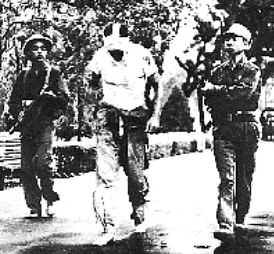 On January 24, 1965, Lieutenant Rowe was pulled from his cage and taken to the canal to be moved by boat to a new prison camp. As he trudged to the sampan he looked off in the distance. Standing chained next to the guards along the bank was a tall man, now extremely gaunt and the once steel-gray hair turned snow white. In that brief glance from a distance, Nick Rowe was shocked and shattered by how badly Rocky Versace looked, despite a sense of relief that he was still alive. Nick wrote:
On January 24, 1965, Lieutenant Rowe was pulled from his cage and taken to the canal to be moved by boat to a new prison camp. As he trudged to the sampan he looked off in the distance. Standing chained next to the guards along the bank was a tall man, now extremely gaunt and the once steel-gray hair turned snow white. In that brief glance from a distance, Nick Rowe was shocked and shattered by how badly Rocky Versace looked, despite a sense of relief that he was still alive. Nick wrote:
In the months that followed, other American prisoners were moved in and out of prison camps deep within the Forest of Darkness. Among them were four Special Forces advisers who had been captured a month after the battle near Le Coeur. Sergeants Isaac "Ike Camacho, Kenneth M. Roraback, George E. "Smitty" Smith, and Claude D. McClure were captured on November 24, 1963, when their camp at Hiep Hoa was overrun by Viet Cong forces. Initially, the four were held at prison camps in the Plain of Reed's southwest of Hiep Hoa but were later moved to the U Minh Forest where they were held in a separate camp from that which housed Versace, Rowe, and Pitzer.
Other prisoners also came and went including Marine Captain Donald Cook who died in captivity and was later awarded the Medal of Honor. On July 9, 1964, Sergeant Ike Camacho escaped the camp and eluded recapture for four days before finding his way to freedom. He was the first American to escape from a Viet Cong prison during the Vietnam War.
On Sunday, September 26, 1965, the Viet Cong interrogators gathered their American prisoners and forced them to listen to a National Liberation Front Radio broadcast in English. The practice was not new, prisoners had previously been encouraged to listen to these propaganda messages. On this day the voice across the radio spoke of two American prisoners, Captain Humbert Rocky Versace and Sergeant First Class Kenneth Roraback. The announcer told his audience that both men were "unrepentant reactionaries who had been punished for their crimes" by order of the high command of the National Liberation Front. Both men, the voice announced, had been executed.
The news crushed the hearts of the American prisoners. The same news was subsequently carried on radio and television stations in the United States, where the families of both soldiers first heard of the death of their sons on the six o'clock news. For Roque Versace's father, according to one of his surviving sons, learning of Rocky's death from the nightly news was one of the most crushing aspects of the sad turn of events.
Sergeants Claude McClure and George Smith were released from captivity in November of 1965. As the year 1966 dawned in Vietnam, of the seven Green Berets captured from the outposts at Tan Phu and Hiep Hoa two years earlier, only Pitzer and Rowe remained in captivity. Two (Versace and Roraback) had been executed, Camacho had escaped, and two had been repatriated. In November 1967, Sergeant First Class Pitzer was released from Cambodia along with two prisoners badly in need of medical attention. Lieutenant Rowe's cover story about being an engineer had been blown, ironically enough at the hands of a group of American war protesters who had researched the history of POWs identified by the National Liberation Front and passed that information on to his captors. Betrayed by citizens of his own Nation, Rowe was severely punished for his deception and scheduled for execution.
In December 1968, with nothing to lose, Lieutenant Rowe struck down his guard when a flight of American helicopters ventured into the area where he was held. Running into a clearing, the American pilots saw and rescued him. In 1971 Major Rowe, who had been promoted during his captivity, wrote his experiences in the book titled Five Years to Freedom.
Rowe remained in the Army and in 1987 was assigned to duty in the Philippines where he assisted in training anti-communist forces. On April 21, 1989, a machine gun sniper attacked his car, killing him instantly in a planned assassination. Daniel Pitzer retired from the US Army as a Sergeant Major. He died in 1998. With the loss of these two soldiers, men who suffered from Captain Versace, one might have thought the story of the Rock would fade into oblivion.
But Rocky's story was too bold, too inspiring, to ever be forgotten.
Shortly after his daring escape in 1968, Major Rowe was invited to the White House to meet with President Richard Nixon and recount the events of his captivity. Colonel Ray Nutter, an Army congressional liaison officer attended the private meeting and recalled:
"Mr. Nixon wasn't really prepared for what Nick had to say. I don't think any of us were. Maybe later, we got hardened to this sort of thing. But in '69, to hear the story Nick told was very emotional.
"When Major Rowe was finished, the President didn't say anything. He was very emotional and moved. He got up and shook the major's hand, gave him a hug, and had tears in his eyes. He said it was one of the most amazing stories he had ever heard. He turned to me and said, 'Did you understand what the major wanted?'
"I said, 'Yes, sir.'
"He said, 'Can you take care of this Colonel?'
"And I said, 'After being in here, sir, I can take care of most anything.'"
What Major Rowe had wanted was the Medal of Honor, not for himself, but for the man whose example had so inspired him, and motivated him through five years of captivity. Almost as quickly as the private meeting ended, Major Rowe submitted the paperwork nominating Special Forces Captain Humbert Roque Versace for the Medal of Honor.
In moves that infuriated Major Rowe for the rest of his life, for some reason and in spite of the President's own endorsement during that 1969 meeting, Rocky's Medal of Honor was not to be. The paperwork sat without official attention for two years, and then the award was downgraded to the Silver Star.
The Memorial
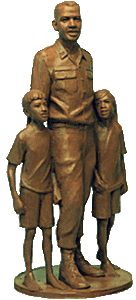
Even after the deaths of Rowe and Pitzer, Rocky Versace could not be forgotten. He was remembered with reverence in the halls of the US Military Academy where he had graduated. He was also remembered at home in Alexandria, Virginia by surviving family and admiring patriots.
On July 6, 2002, a memorial to the intrepid man who wouldn't break, wouldn't bend, was unveiled. Among those in attendance were a former Special Forces Captain and member of the West Point Class of 1959. Though he left the Academy before graduation and never met Rocky Versace while they were students together, Captain Roger Donlon felt a unique kinship to the American hero. On July 6, 1965, while Rocky Versace was still resisting his captors, Captain Roger Donlon and Detachment A-726 fought into the early morning hours to repulse an overwhelming enemy force in an attack on their outpost at Nam Dong. In that action, Captain Donlon became the FIRST Medal of Honor recipient of the Vietnam War.
The memorial at the Mount Vernon Recreation Area displays a bronze image of Roque Versace embraced by two children of Vietnam. "The smiling figure is turning toward the children, who in kind return his joy. He is in military fatigues and is standing at peace without any weaponry. The sculpture stands as a symbolic reminder of what could have been and what could be. It is what all of Alexandria's Vietnam Veterans hoped for...peace." Carved in the marble base are the words:
Dedicated to Captain Humbert Roque 'Rocky' Versace,
A Kid from The Neighborhood Who Had the Faith And Never Gave In.
The Medal of Honor
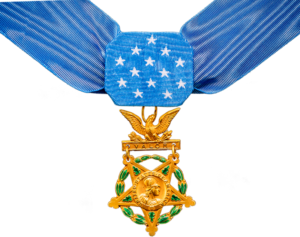
The Friends of Rocky Versace, a group of veterans and civilians determined to see him remembered not as a prisoner but as one of our Nation's greatest heroes refused to let history forget his shining example of Duty, Honor, and Country.
On that day, President George W. Bush finally granted the request made more than 30 years earlier by Nick Rowe, and Rocky Versace's family received his award of the Medal of Honor.
Sources:
Five Years to Freedom by Nick Rowe
"The Animal Called POW" by MSgt Daniel Pitzer, Look Magazine, Feb 18, 1969
"Honoring the Defiant One", by Steve Vogel, The Washington Post, May 27, 2001
Pacific Stars and Stripes, VIETNAM Front Pages, 1986
Neil Mishalov's Vietnam War Medal of Honor Website
About the Author
Jim Fausone is a partner with Legal Help For Veterans, PLLC, with over twenty years of experience helping veterans apply for service-connected disability benefits and starting their claims, appealing VA decisions, and filing claims for an increased disability rating so veterans can receive a higher level of benefits.
If you were denied service connection or benefits for any service-connected disease, our firm can help. We can also put you and your family in touch with other critical resources to ensure you receive the treatment you deserve.
Give us a call at (800) 693-4800 or visit us online at www.LegalHelpForVeterans.com.
This electronic book is available for free download and printing from www.homeofheroes.com. You may print and distribute in quantity for all non-profit, and educational purposes.
Copyright © 2018 by Legal Help for Veterans, PLLC
ALL RIGHTS RESERVED



